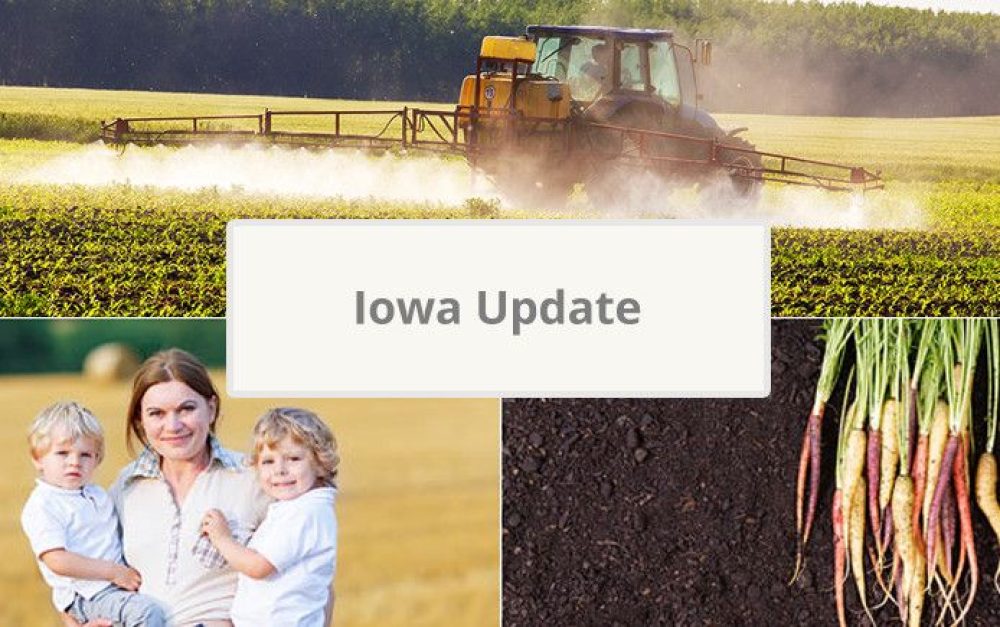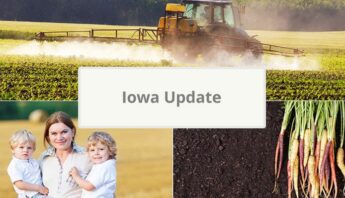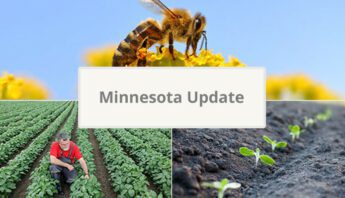Iowa is one of the states in which PAN does on-the-ground campaign work. We send out regular updates on PAN and partners’ work in Iowa and beyond — from pesticide-related science to opportunities to take action. If you’d like to receive these updates via email, sign up here.
State updates
Why should you vote?: As PAN’s Communications Associate in Iowa, you might expect me to answer this question by saying I want you to vote for people you think will support our initiatives to stop drift, support a working and just food system, and promote sustainable farming practices. But, my answer goes beyond that:
- I think you should vote because we need to select public servants who will be responsive when we bring our concerns to them. Regardless of how you might feel about particular issues, when it is clear that an elected official is not interested in hearing from us, they are no longer serving us. When the time comes that you need something from a public servant, you will want them to treat you with respect and discuss your needs — even if what you want does not match their preferences. Voting individuals in (or out) of public office is our way to ensure that they are responsive to us, the people they serve.
- I think you should vote because we need public servants who will gather facts, seek expert advice, and make decisions about things YOU have knowledge of. Each of us has expertise in something, but none of us are experts in all things. It takes input from all of us, with our collective knowledge, to aid in the selection of elected officials who will find the experts that are needed and consult with them to make the most informed decisions. If you choose to withhold your vote, you are failing to represent the things for which you have insight and responsibility. Your input is important.
And, yes, it would be nice if our elected officials would take action on our priorities — pesticide drift, food systems, and sustainable farming practices. But, if we elect responsive individuals who will seek diverse expert advice, won’t we have a better chance that can happen?
How do you vote in Iowa?
- Register to vote by October 24 or register to vote at the polls November 3.
- You can request an absentee ballot to be mailed to you by October 24.
- You can mail in your ballot; have it postmarked by November 2.
- You can go to your county’s auditor’s office and fill in an absentee ballot any weekday until November 2
- You can go to your polling place on November 3.
Go to the Iowa Voter Ready site implemented by the Secretary of State for information on how to register and check your eligibility to vote, how to vote, to track your absentee ballot’s progress, and other useful information regarding your participation.
National updates
Consumer Reports looks at pesticide residues on food: Consumer Reports used five years of data taken from the USDA’s Pesticide Data Program (2014-2018) to calculate a safety rating based on health risks to an average four-year-old child who is regularly exposed to produce contaminated with pesticides. This rating is a combined analysis of the number of pesticides detected for each food type, the frequency pesticides were found, the average amount of residue, and the toxicity of the specific pesticide found in residues.
Unsurprisingly, the article found that organic fruits and vegetables were more likely to be “cleaner,” having less pesticide residue than “non-organic” produce. Certain produce, such as green beans, potatoes and peaches, showed high levels of dangerous pesticide residues, enough to cause concerns for human health. Combined with PAN’s What’s On My Food website, Consumer Reports’ ratings provide solid information that shows us that, sometimes, we are eating pesticides.
The threat of gene-silencing pesticides: A new report released by Friends of the Earth raises the alarm for a new technology that has little-to-no regulatory control domestically and abroad. Agrichemical corporations are moving to submit pesticides that use RNA interference (RNAi) to suppress or “switch off” genes that are essential for the survival of insects, resulting in their death.
These pesticides would be intended to be applied to a “target crop,” potentially coming into contact with non-target organisms that may also be affected by the chemical. These new products could become a “vast open-air genetic experiment” and may result in “unintended genetic consequences [that] could … persist in the environment for generations to come.” Agri-business sees this as the future of pesticides, but that future is riddled with significant risks to the rest of us.
Upcoming events
Iowa Farmers Union is accepting applications for $500 Derecho Storm Disaster Relief Grants. Awards are intended as disaster relief for farmers and their families.
Practical Farmers of Iowa is still looking for a few more participants in a Post-Derecho High Tunnel build near Mount Vernon on October 10 and 11.
The Tallgrass Prairie Center is promoting a webinar focusing on the Conservation of Monarchs in Mexico. This event is sponsored by Monarch Joint Venture and the U.S. Fish & Wildlife Service on October 27 from 1 to 2 pm.
A late October PFI field day is the first of a series focusing on Raising Sheep for Wool. Tune in October 27 from 2 to 3 pm for this virtual event.
The Women, Food and Agriculture Networks’ annual (remote!) conference is November 6 and 7. Register here.
The Center for Rural Affairs is sponsoring a multiple day webinar focused on Disaster and Recovery / Desastre y Recuperación (Español) for Small Business. Register by October 9.
Unfortunately, the Prairie Palooza Seminars in Decorah have been postponed, hopefully to be resumed in 2021.
Take action
On Tuesday, November 17 at 12pm PT, Pesticide Action Network (PAN) and Hawai’i Alliance for Progressive Action (HAPA) will launch the animated video short Seed Keepers and Truth Tellers: From the Frontlines of GM Agriculture. Join us for an online launch party, panel discussion, and screening!







